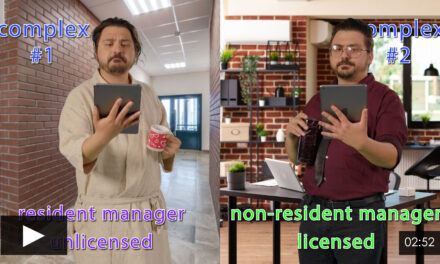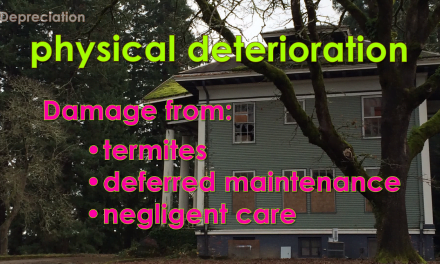Beware: license required!
Managing an apartment complex or any other income-producing property does not require any specific “property management” license or certificate. Rather, a property manager does need to be licensed by the California Department of Real Estate (DRE) as a real estate broker.
A broker license issued by the DRE is required to perform any of the following services as a property manager on behalf of an income property owner:
- listing real estate for lease or rent;
- marketing the property to locate prospective tenants;
- listing prospective tenants for their rental or lease of real estate;
- locating property to lease or rent;
- selling, buying or exchanging existing leasehold interests in real estate;
- managing the operation of an income-producing property; or
- collecting rents from tenants of real estate. [Calif. Business and Professions Code §10131(b)]
An individual employed by the property manager to perform any of these services also needs to hold a DRE license, either as a broker-associate or sales agent.
However, some administrative and non-discretionary property management activities do not require a real estate license. [Bus & P C §10131.01(a)]
Unlicensed vs. licensed property management activities
Unlicensed employees may perform tenant-related actions in apartment and vacation rentals, such as:
- showing available units and facilities to prospective tenants;
- providing prospective tenants with information about listed rent rates and boilerplate lease and rental agreement provisions [See RPI Form 550 and 551];
- providing prospective tenants with tenant application forms and answering questions regarding their completion [See RPI Form 553];
- accepting tenant screening fees;
- accepting signed lease and rental agreements from tenants; and
- accepting rents and security deposits. [Bus & P C §10131.01(a)(1)]
Licensed employees may perform any activities unlicensed employees are permitted to perform. However, licensed employees may additionally perform activities relating to contacts with the landlord, as opposed to the tenant, about leasing, care of the property and accounting for funds.
Activities only licensed employees may perform include:
- landlord-related solicitations;
- entering into property management or leasing agent agreements with the landlord;
- listings and lease or rental negotiations;
- care and maintenance of the property;
- marketing of the listed space; and
- accounting for rents, deposits and disbursements.
Exceptions and exemptions
An individual given authority by an income property owner to act as their “attorney in fact” under a power of attorney may temporarily manage the owner’s property and is exempt from licensing requirements. [Bus & P C §10133(a)(2); see RPI Form 447]
However, the power-of-attorney authority may not be used to continuously manage real estate, an activity which requires a broker license. The power-of-attorney exemption applies only to situations where the landlord is compelled by necessity, such as a vacation or illness, to authorize another person to complete a specific or isolated transaction. Thus, the power-of-attorney exemption cannot be used to indefinitely avoid licensing requirements. [Sheetz v. Edmonds (1988) 201 CA3d 1432]
Additionally, apartment building management rules distinguish resident managers from nonresident property managers.
A resident manager is employed by either the landlord or the broker to manage the apartment building or complex. The resident manager by definition lives on the premises as a requirement of their employment, and does not need a real estate license to manage the apartment complex. [See RPI Form 591; Bus & P C §10131.01(a)(1)]
A resident manager of one apartment complex is barred from being the property manager of a separate apartment complex unless they are licensed. [Bus & P C §10131(b)]
Apartment complexes with 16 or more units are required to have a resident manager. [25 Calif. Code of Regulations §42]
An individual is not required to have a real estate broker license when they are acting:
- as an attorney performing management as incidental to their legal services [Bus & P C §10133(a)(3)]; or
- under court appointment, such as a receiver or bankruptcy trustee. [Bus & P C §10133(a)(4)]
These exceptions are typically short-term and refer to specific properties.
However, an individual whose business is advertised or held out as fundamentally including property management for others needs to comply with real estate licensing laws. Individuals managing property without a license and without qualifying for an exemption will not be able to receive a fee. [Bus & P C §10137]
A licensed misconception
It is a widely held misconception that property managers are required to hold a Certified Property Manager (CPM) membership with the Institute of Real Estate Management (IREM) to perform property management activities.
However, this is a non-government designation bestowed (for a fee) by a private non-regulatory organization. Brokers and agents may earn designations by completing private coursework and submitting proof of a certain number of years of property management experience, though this is not a legal mandate.
Other non-required third-party property management designations include:
- the certified apartment manager (CAM) designation;
- the accredited resident manager (ARM) designation;
- the registered in apartment management (RAM) designation; and
- the certified apartment supervisor (CAPS) designation.
None of the above designations are legally required to be employed by a property owner or broker. Further, the criteria for obtaining these designations are determined entirely by private organizations.
The designations are often costly and do not guarantee employment in property management. Some employers may favor a licensee who holds such a designation, while others do not consider them at all.
This article was originally published July 2016, and has been updated.















Very nice article.
At my apartment complex, the person designated resident manager has changed titles several times. Some places, they’re listed as property manager, others as resident manager, and most recently, as Area Manager. This individual has a valid salesperson license, but is NOT under a supervising broker as listed on the CA DRE website. I think that this new area manager title means they are overseeing more than one property. Is this legal?
Hello Stephen,
We are happy to clarify our writings, though are unable to comment on your specific fact situation or offer legal advice.
Best regards,
Editorial Staff